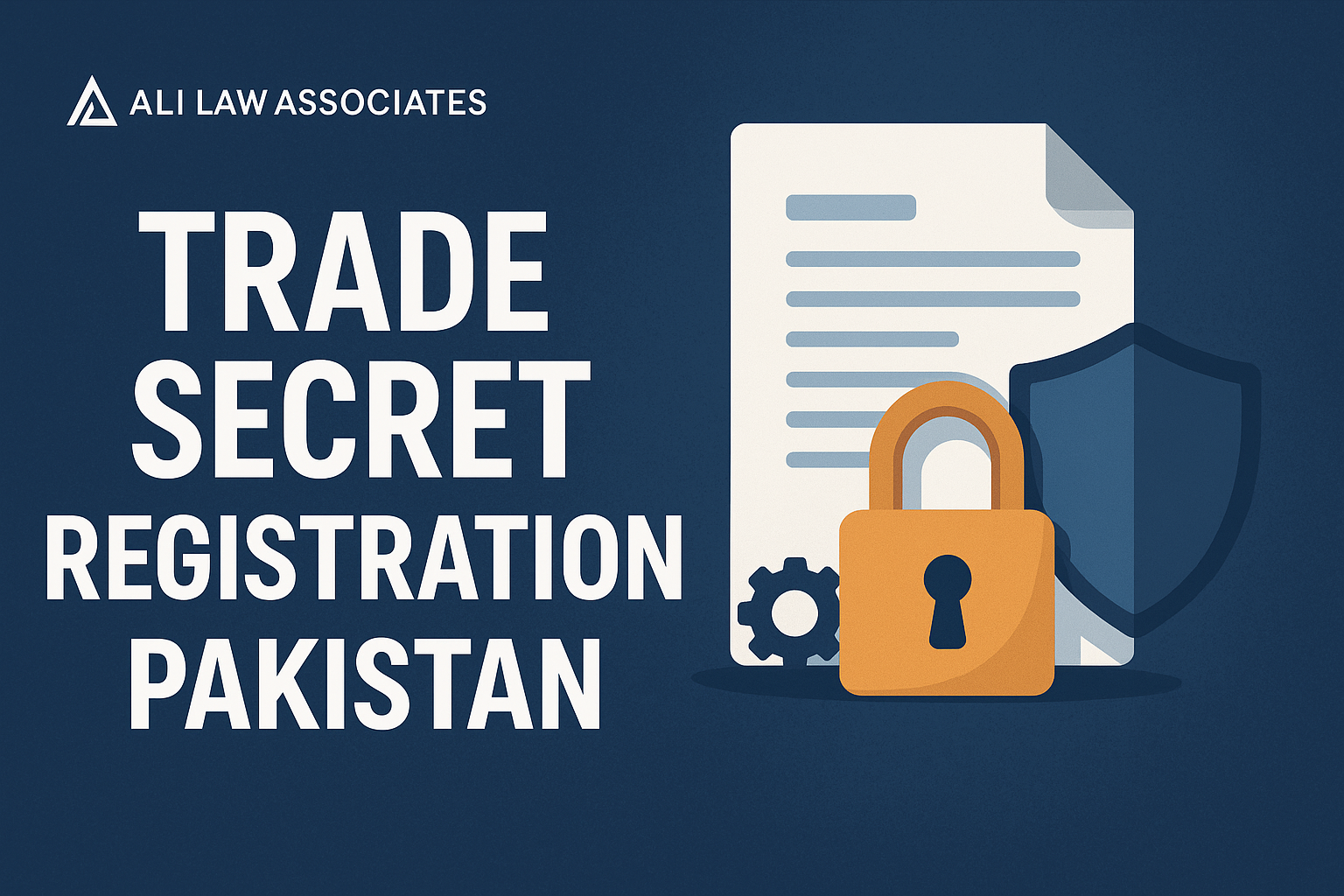Introduction
In a competitive marketplace, protecting your proprietary strategies, processes, and intangible assets is essential. Trade Secret Rights Registration, although not formally mandated, plays a crucial role in safeguarding confidential business information—ensuring you retain your competitive edge. Under Pakistan’s Income Tax Ordinance, 2001, especially post-2024 amendments, such protections affect not just legal standing but also taxation and monetization. Partnering with Ali Law Associates, we guide you through robust trade secret protection—through NDAs, contracts, common law, and cyber safeguards.
Section 1: Understanding Trade Secret Rights Under Income Tax Ordinance, 2001
While trade secrets in Pakistan don’t require formal registration, their protection is indirectly enforced under tax laws. Recently, the Finance Act 2024 amended Section 108(6) of the Income Tax Ordinance, 2001, disallowing 25% of certain payments (like royalty or secret formula licensing) as deductions unless proper explanations are furnished to the tax authorities Trade.gov. This underscores the tax implications tied to confidential business secrets and intellectual property, emphasizing the importance of structured documentation and legal backing.
Why This Matters for You:
- Tax Compliance: Avoid deduction disallowances by maintaining clear, documented usage or payments related to trade secrets.
- Financial Clarity: Proper justification supports allowed deductions and prevents financial penalties.
- Legal Readiness: Enhanced legal support serves both business strategy and tax defense.
Section 2: Key Legal Tools for Trade Secret Protection in Pakistan
Here’s how you can build comprehensive protection:
1. Confidentiality Agreements (NDAs)
A cornerstone of trade secret protection, NDAs formalize obligations to keep information confidential during disclosures—whether to employees, vendors, or partners.
2. Contractual Safeguards
Embed confidentiality clauses and IP ownership terms within employment contracts and vendor agreements. This ensures any innovation or knowledge developed stays within your control.
3. Common Law Protections
Under Pakistani common law, misappropriation of trade secrets may invoke tort remedies, such as injunctions, damages, and delivery of infringing materials.
4. Legal Enforcement via Penal Code & Cyber Law
- Pakistan Penal Code (PPC): Offers recourse against theft, criminal breach of trust, or unauthorized disclosures.
- Electronic Crimes Act: Provides additional protection in digital environments, focusing on unauthorized access or data breaches.
5. Tax-Related Documentation
Satisfying the FBR’s scrutiny under Section 108(6) requires maintaining detailed records showing that any benefits of transferring IP—including secret formulas or processes—do not inure to an associate. This reinforces both your tax compliance and internal protocols.
Section 3: Interlinking Legal Protections with Tax Strategy (Internal Link Example)
For a deeper dive on tax compliance nuances, see our breakdown of Tax Deductions & IP Payments. To bolster your contractual framework, explore Drafting Effective NDAs and Employment Agreements. These resources help integrate your trade secret strategy with broader business, HR, and financial planning.
Section 4: Step-by-Step Guide to Secure Your Trade Secrets
1. Audit Your Trade Secrets
- List critical proprietary assets: formulas, workflows, business strategies, customer data.
- Classify based on sensitivity, value, and risk of exposure.
2. Establish NDAs Across the Board
- Develop tailored NDAs for employees, consultants, and partners.
- Define scope, duration, exclusions, and remedies clearly.
3. Integrate Confidentiality in All Agreements
- Ensure employment, contractor, vendor, and licensing contracts include strong clauses about secrecy and ownership.
- Include explicit non-disclosure and return or destruction provisions.
4. Implement Internal Security Protocols
- Limit access based on roles.
- Use secure storage and digital encryption.
- Regularly train staff on data handling and breach response.
5. Document Tax-Justified Use and Sharing
- Record when and why trade secrets are used or licensed.
- Maintain evidence (invoices, contracts, explanations) proving independent benefit.
- This is pivotal for compliance with section 108(6) disallowance rules Trade.gov.
6. Leverage Legal Enforcement Framework
- If misappropriation occurs, invoke common law tort or breach.
- File criminal or cyber complaints as applicable under PPC or the Electronic Crimes Act.
7. Maintain Oversight and Review
- Periodically revisit trade secrets and protection policies.
- Update NDAs and contracts per business changes.
- Run internal compliance audits to verify documentation integrity.
Section 5: Benefits of Formal Trade Secret Protection
| Benefit | Description |
|---|---|
| Competitive Advantage | Secures proprietary knowledge that sets you apart in the market. |
| Tax Compliance | Meets FBR’s requirements, helping avoid deduction rejections. |
| Legal Readiness | Enables stronger defense and enforcement when trade secret theft occurs. |
| Reputation & Trust | Builds credibility with stakeholders by demonstrating solid IP governance. |
| Loss Mitigation | Early identification of leaks prevents larger operational and financial harm. |
Section 6: When You Need Ali Law Associates
At Ali Law Associates, we tailor protection strategies to your business:
- Document Drafting: Customized NDAs, contracts, and IP clauses.
- Audit & Policy Design: Structured internal frameworks for secure operations.
- Legal Defense: Expert support in litigation, tax disputes, or cyber breaches.
- Tax Advisory: Ensuring accurate justification under the Income Tax Ordinance, 2001.
- Training & Awareness: Educating your team for sustained governance.
Section 7: Useful External Resources
- Download the full Income Tax Ordinance, 2001 (updated up to June 30, 2024) via FBR’s official repository FBR DownloadWikipedia.
- For a broader view of Pakistan’s tax system and reforms—including digital invoicing and enforcement mechanisms—see: Taxation in Pakistan (Wikipedia) Wikipedia.
Conclusion
Trade secrets are more than confidential information—they’re strategic assets. Registering and protecting them through legal frameworks, corporate protocols, and tax-aware documentation is essential for sustainable success in Pakistan’s market. Partner with Ali Law Associates today to secure your competitive advantage, ensure legal resilience, and align with Pakistan’s tax requirements efficiently.


